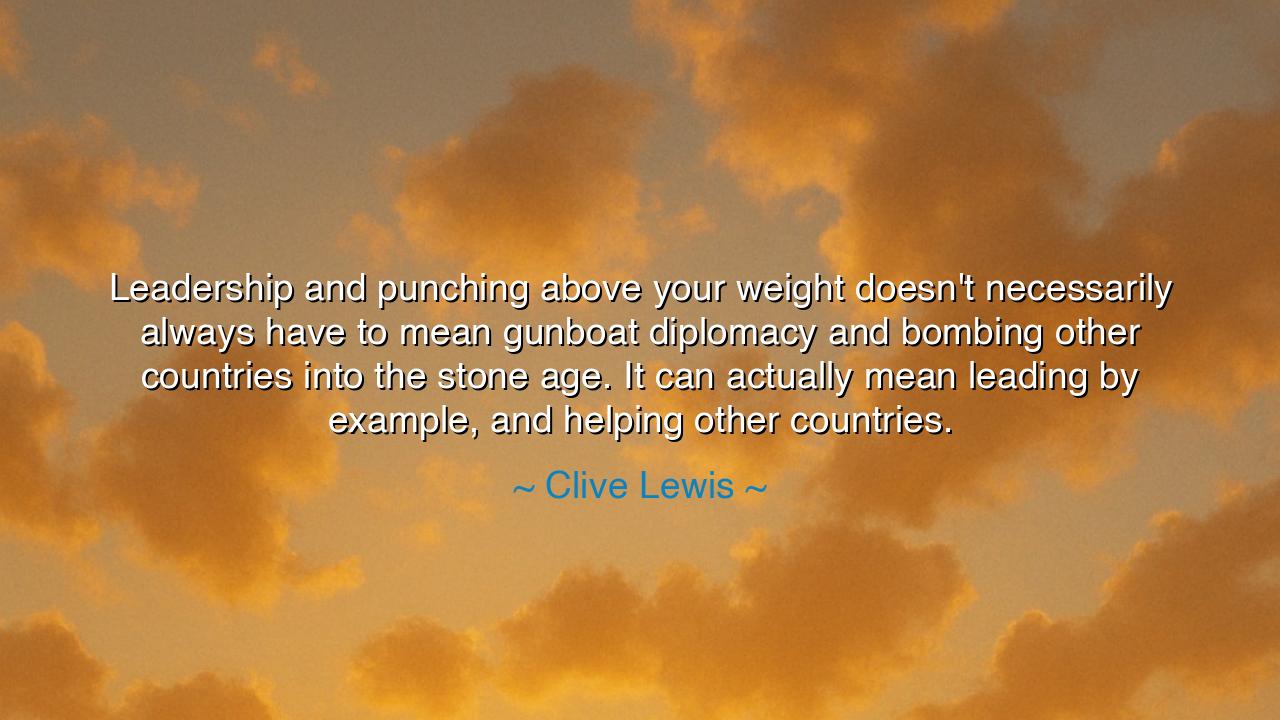
Leadership and punching above your weight doesn't necessarily
Leadership and punching above your weight doesn't necessarily always have to mean gunboat diplomacy and bombing other countries into the stone age. It can actually mean leading by example, and helping other countries.






In the grand saga of human history, there are countless tales of leaders who sought to expand their influence through force, imposing their will upon others with weapons and armies. Yet, there is another kind of leadership, one that does not rely on gunboat diplomacy or the devastation of war. Clive Lewis, in his wisdom, reminds us of this profound truth: "Leadership and punching above your weight doesn't necessarily always have to mean gunboat diplomacy and bombing other countries into the stone age. It can actually mean leading by example, and helping other countries." These words speak to the heart of true leadership—a leadership that is not defined by might or the dominance of others, but by the strength of character, the power of compassion, and the ability to inspire through action.
What, then, does it mean to punch above your weight in a world where so much is often defined by military might and political maneuvering? The phrase suggests a sense of surpassing one's natural limitations, of achieving something greater than what might be expected given one's size, power, or resources. But Lewis calls us to reframe that idea—to see that true power is not simply about imposing one's will, but about leading in a way that inspires and uplifts others. To punch above your weight in the realm of diplomacy and leadership, according to Lewis, is not to flex military might, but to lead with wisdom, integrity, and the understanding that the world is made better by actions that foster peace and cooperation, rather than conflict.
The ancients understood the value of leadership that transcended brute force. Consider the great Alexander the Great, whose military genius led him to create one of the most expansive empires in history. Yet, even Alexander, in his pursuit of conquest, understood the importance of cultural exchange and governance. He didn’t merely seek to destroy and conquer; he also sought to integrate the cultures he encountered, blending them with his own. The Hellenistic Age, which emerged from his conquests, is a testament to the idea that true leadership is not solely about overpowering others, but about creating a lasting legacy that benefits many. His ability to lead by example—by embracing and promoting the best aspects of various cultures—was a form of leadership that punches above its weight.
Similarly, the Roman Empire under Augustus also offers an example of leadership that did not rely solely on the might of the legions. Augustus, though a formidable leader in battle, understood that empire-building was about more than military success. His reign marked the beginning of a pax Romana, a period of relative peace and prosperity across the Mediterranean. Under his leadership, the empire flourished through economic stability, infrastructure development, and cultural integration. His leadership was one that led by example, inspiring loyalty and cooperation across vast lands, not through fear of retribution, but through the strength of his vision and the well-being of his people.
In more modern history, we see leaders who have exemplified punching above their weight in less violent, more compassionate ways. Nelson Mandela, the great anti-apartheid leader, may have been a man from a small country, but his vision and commitment to peace made him a towering figure on the world stage. Mandela did not seek to destroy his enemies; instead, he sought reconciliation, understanding, and the lifting up of his people. His leadership was not defined by military power or the ability to wage war, but by his unwavering commitment to justice and his capacity to forgive. He showed the world that true strength lies not in domination, but in unity and the building of a better world for all.
The lesson here, then, is one of humility, wisdom, and vision. Lewis’ words call us to reconsider our approach to leadership. In a world where the most powerful nations are often those that possess the largest armies, we must ask ourselves what true leadership really means. It is not enough to lead with force and fear—real power lies in leading by example, in using one’s influence to elevate others, to inspire and assist in creating a more equitable and peaceful world. As leaders, we must recognize that we are not simply caretakers of our own nations, but stewards of a shared human destiny.
As we move through our own lives, whether as citizens, parents, leaders, or community members, we must strive to punch above our weight in the way we lead. We must learn that true leadership is not about defeating others, but about lifting others up. It is not measured by the number of battles won, but by the legacy of kindness, collaboration, and growth we leave behind. In our workplaces, our families, and our communities, let us embody the leadership that Clive Lewis speaks of—leadership that builds, that empowers, and that inspires others to do the same. Only then will we truly punch above our weight—not with fists or force, but with hearts and minds united in the pursuit of greater good.






AAdministratorAdministrator
Welcome, honored guests. Please leave a comment, we will respond soon